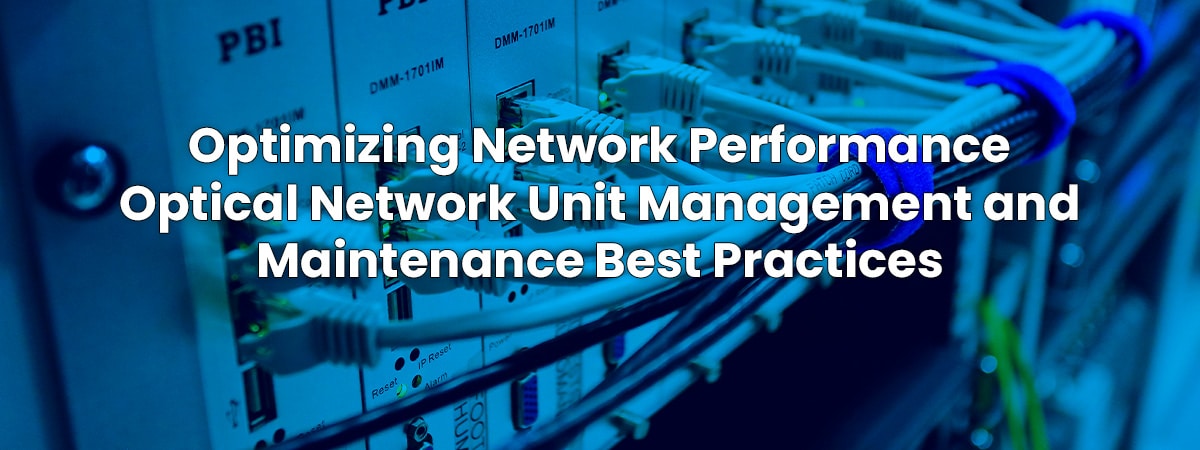Introduction
In today’s interconnected world, Optical Network Units (ONUs) play a critical role in delivering high-speed internet connectivity to homes, businesses, and institutions. As the last-mile connection point in Fiber-to-the-Premises (FTTP) networks, ONUs are responsible for transmitting data between the optical fiber backbone and end-user devices. To ensure optimal network performance, it is crucial to implement effective ONU management and maintenance practices. In this article, we will explore key strategies for managing and maintaining ONUs, enabling network operators to enhance reliability, efficiency, and customer satisfaction.
Proactive Monitoring and Performance Management
Proactive monitoring is essential to identify potential network issues before they escalate into service disruptions. Network operators should employ robust monitoring tools to continuously monitor key performance indicators (KPIs) of ONUs. These KPIs may include signal strength, signal-to-noise ratio, bit error rate, and other relevant metrics. By closely monitoring ONU performance, operators can quickly detect anomalies, proactively address potential problems, and maintain optimal network performance.
Furthermore, leveraging advanced performance management systems can provide valuable insights into network utilization trends, capacity planning, and service-level agreements (SLAs). This data-driven approach enables operators to optimize network resources, ensure sufficient bandwidth allocation, and effectively manage customer expectations.
Regular Firmware Updates and ONU Configuration Management
Firmware updates are crucial for keeping ONUs secure, reliable, and compatible with evolving network technologies. Network operators should establish a systematic approach to regularly update ONU firmware to benefit from bug fixes, security patches, and performance enhancements. This ensures that ONUs are operating with the latest software versions, minimizing vulnerabilities and maximizing their capabilities.
Effective configuration management is also vital to ensure consistent performance across ONUs. Operators should maintain a centralized configuration database, enabling them to deploy standardized configurations to multiple ONUs simultaneously. This streamlines the provisioning process, reduces configuration errors, and facilitates efficient troubleshooting.
Proactive Fault Management and Troubleshooting
To maintain uninterrupted service, network operators should implement proactive fault management strategies. Automated fault detection mechanisms can monitor ONU health in real-time and trigger alerts for potential issues such as signal degradation, hardware failures, or power supply disruptions. Timely notifications enable operators to swiftly initiate troubleshooting procedures, minimizing downtime and customer impact.
Additionally, establishing efficient troubleshooting workflows and documentation is critical for resolving ONU-related issues promptly. Creating a knowledge base that catalogs common problems, their resolutions, and troubleshooting steps can significantly improve the efficiency of support teams. This empowers technicians to quickly diagnose and resolve ONU issues, resulting in enhanced customer satisfaction.
Regular Performance Audits and Capacity Planning
Periodic performance audits and capacity planning are crucial aspects of ONU management and maintenance. Performance audits involve conducting comprehensive assessments of network health, identifying potential bottlenecks, and evaluating the overall quality of service. By analyzing performance data and conducting thorough audits, network operators can proactively identify areas for improvement, optimize network resources, and deliver a superior user experience.
Capacity planning ensures that the network infrastructure can meet the increasing demands of users over time. Network operators should analyze historical data, growth projections, and market trends to anticipate future capacity requirements. By effectively planning for network expansion, operators can prevent congestion issues, scale resources accordingly, and seamlessly accommodate the evolving needs of customers.
Ongoing Training and Skill Development
Network technology is continuously evolving, requiring network operators to stay updated with the latest advancements and best practices. Providing ongoing training and skill development opportunities for technicians and network engineers is crucial for effective ONU management and maintenance. Training programs should cover areas such as ONU installation, configuration, troubleshooting techniques, and emerging technologies.
By investing in the professional development of personnel, network operators ensure that their teams are equipped with the knowledge and skills to manage ONUs effectively. This enables operators to efficiently address complex network challenges, maintain service reliability, and deliver high-quality customer support.
Conclusion
Effective management and maintenance of Optical Network Units (ONUs) are essential for network operators to ensure reliable and high-performance connectivity. By implementing proactive monitoring, regular firmware updates, efficient configuration management, and proactive fault management, operators can optimize ONU performance and minimize downtime. Additionally, conducting performance audits, capacity planning, and investing in ongoing training ensures the network infrastructure stays aligned with the evolving needs of users. By prioritizing ONU management and maintenance best practices, network operators can deliver exceptional network services, enhance customer satisfaction, and remain competitive in today’s fast-paced digital landscape.
